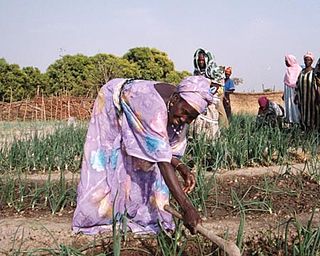
A housing cooperative, or housing co-op, is a legal entity, usually a cooperative or a corporation, which owns real estate, consisting of one or more residential buildings; it is one type of housing tenure. Typically housing cooperatives are owned by shareholders but in some cases they can be owned by a non-profit organization. They are a distinctive form of home ownership that have many characteristics that differ from other residential arrangements such as single family home ownership, condominiums and renting.
Natural Resources Conservation Service (NRCS), formerly known as the Soil Conservation Service (SCS), is an agency of the United States Department of Agriculture (USDA) that provides technical assistance to farmers and other private landowners and managers.
The North American Students of Cooperation (NASCO) is a federation of housing cooperatives in Canada and the United States, started in 1968. Traditionally, NASCO has been associated with student housing cooperatives, though non-student cooperatives are included in its network. NASCO provides its member cooperatives with operational assistance, encourages the development of new cooperatives, and serves as an advocate for cooperatives to government, universities, and communities. NASCO teaches leadership skills, provides information, and serves as a central link in facilitating the fruition of the cooperative vision for students and youth.

The Co-operative Group Limited, trading as Co-op and formerly known as the Co-operative Wholesale Society, is a British consumer co-operative with a group of retail businesses, including grocery retail and wholesale, legal services, funerals and insurance, and social enterprise.
A worker cooperative is a cooperative owned and self-managed by its workers. This control may mean a firm where every worker-owner participates in decision-making in a democratic fashion, or it may refer to one in which management is elected by every worker-owner who each have one vote. Worker cooperatives may also be referred to as labor-managed firms.
The Agricultural Marketing Service (AMS) is an agency of the United States Department of Agriculture; it maintains programs in five commodity areas: cotton and tobacco; dairy; fruit and vegetable; livestock and seed; and poultry. These programs provide testing, standardization, grading and market news services for those commodities, and oversee marketing agreements and orders, administer research and promotion programs, and purchase commodities for federal food programs. The AMS enforces certain federal laws such as the Perishable Agricultural Commodities Act and the Federal Seed Act. The AMS budget is $1.2 billion. It is headquartered in the Jamie L. Whitten Building in Washington, D.C.
The Rural Business-Cooperative Service is one of three agencies within USDA Rural Development responsible for administering various economic development programs to rural communities in the United States and its territories. Because these three agencies are closely aligned, they are commonly referred to as the USDA Rural Development, Business & Cooperative Programs.

An agricultural cooperative, also known as a farmers' co-op, is a producer cooperative in which farmers pool their resources in certain areas of activities.

The U.S. African Development Foundation (USADF) is an independent U.S. government agency established by Congress in 1980 to invest directly in African grassroots enterprises and social entrepreneurs. USADF's investments aim to increase incomes, revenues, and jobs by promoting self-reliance and market-based solutions to poverty. USADF targets marginalized populations and underserved communities in the Sahel, Great Lakes, and the Horn of Africa. It partners with African governments, other U.S. government agencies, private corporations, and foundations to achieve transformative results.
Peter Berghsey Johnsen is an American scientist, administrator and adventurer.
People's Food Co-op or just the People's Co-op is a food cooperative located in Portland, Oregon. Founded in 1970 by the members of a food-buying club, the co-op is owned by over 3000 member-owners and is a member of the National Cooperative Grocers Association and the United States Federation of Worker Cooperatives.
The agricultural policy of the United States is composed primarily of the periodically renewed federal U.S. farm bills. The Farm Bills have a rich history which initially sought to provide income and price support to US farmers and prevent them from adverse global as well as local supply and demand shocks. This implied an elaborate subsidy program which supports domestic production by either direct payments or through price support measures. The former incentivizes farmers to grow certain crops which are eligible for such payments through environmentally conscientious practices of farming. The latter protects farmers from vagaries of price fluctuations by ensuring a minimum price and fulfilling their shortfalls in revenue upon a fall in price. Lately, there are other measures through which the government encourages crop insurance and pays part of the premium for such insurance against various unanticipated outcomes in agriculture.

Agriculture in the Classroom (AITC) is a grassroots program coordinated by the United States Department of Agriculture (USDA) and the National Agriculture in the Classroom Organization. Its goal is to help students gain greater awareness of the role of agriculture in the economy and society, so that they may become citizens who support wise agricultural policies. AITC raises agricultural literacy by helping students understand the farm sources of their food, fabric and flowers.
The phrase women in business refers to female businesspeople who hold positions, particularly leadership in the fields of commerce, business, and entrepreneurship. It advocates for their increased participation in business.
CooperationWorks! is a network of organizations promoting rural development through the formation of cooperatives in the United States. CooperationWorks! is organized as a cooperative of 21 member development centers. The co-op facilitates the coordination of cooperative development efforts and provides business expertise to its member organizations.

The Cooperative Development Foundation (CDF) is a 501(c)(3) charitable organization engaged in cooperative development in the United States. CDF administers revolving loan funds, provides grants, and fosters economic development through the formation of cooperatives. CDF is partnered with the National Cooperative Business Association.
The American Hospital Association's Center for Healthcare Governance (The center) is a membership based organization that is affiliated with the AHA. Founded in 2004 and based in Chicago, Illinois, Center members include more than 500 hospital and health system boards and other organizations that serve the health care sector. The center also provides governance resources and services to the more than 5,000 member organizations of the American Hospital Association. The Mission of the center is to bring about excellence and accountability in governance by being the valued source, for health care leaders and trustees, of innovative governance thinking, information, tools and content. The center is governed by a board of managers and also receives guidance on program and service development from a national board of advisors.

University of Alaska Fairbanks Cooperative Extension Service is an outreach-based educational delivery system supported by a partnership between the United States Department of Agriculture (USDA) and the University of Alaska Fairbanks (UAF). The UAF Cooperative Extension Service annually serves approximately 80,000 Alaskans, “providing a link between Alaska's diverse people and communities by interpreting and extending relevant university, research-based knowledge in an understandable and usable form to the public.” Since 1930 the UAF Extension Service has partnered with many organizations across the state of Alaska in pursuit of fulfilling its land-grant university mission to disseminate agricultural research and other scientific information.

The Cooperative State Research, Education, and Extension Service (CSREES) was an extension agency within the U.S. Department of Agriculture (USDA), part of the executive branch of the federal government. The 1994 Department Reorganization Act, passed by Congress, created CSREES by combining the former Cooperative State Research Service and the Extension Service into a single agency.
Meriwether Lewis Electric Cooperative is a non-profit, member owned utility cooperative that provides electric power service and internet services to rural communities in western Middle Tennessee. It is a 501(c)(12) organization, and is headquartered in Centerville, Tennessee. It was established in 1939 under the Tennessee Electric Cooperative Act of 1939, and also holds a government-granted monopoly on electric power distribution within its service area, which includes Hickman, Houston, Humphreys, Lewis, and Perry counties. It is named after American explorer Meriwether Lewis, who is buried in its service area. MLEC is a part of the Touchstone Energy cooperative federation.








